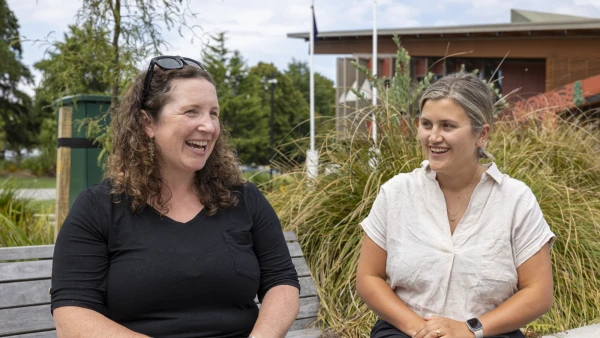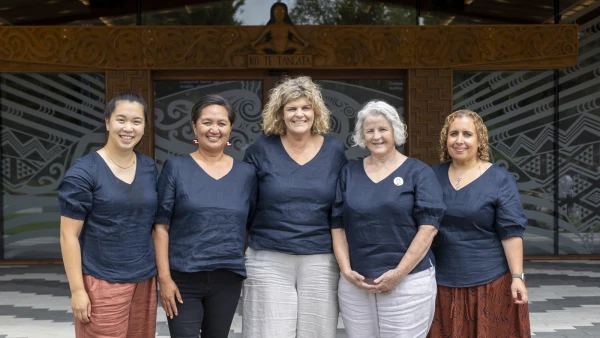The University of Waikato this week welcomed the first cohort of students to its new graduate-entry midwifery programme.
The first of its kind in New Zealand, the two-year master's programme was developed in partnership with local midwives and maternity service providers in response to chronic workforce shortages.
Head of Midwifery Associate Professor Dr Liz James says the programme’s unique offer attracted enrolments from a range of health professionals seeking a career change, from nurses to physiotherapists and pharmacists.
“Our programme recognises the transferable skills these students bring – biomedical sciences, professionalism, communication, an understanding of the health system – and how these skills and experience will benefit them in a new career in midwifery,” she says.

Victoria Donoghue and Ngaio Prince, members of the first cohort of students in Waikato's new midwifery programme
Victoria Donoghue, a respiratory physiotherapist who practices in Hamilton, was one of the first students welcomed to the programme this week.
A member of the Professional Practice Committee for Physiotherapy New Zealand and provider of professional supervision to physiotherapists, Ms Donoghue says she has a long-held interest in studying midwifery.
“One of the things I enjoy as a health practitioner is nurturing relationships, and with midwifery, you get to do that right from the beginning of the pregnancy, through the birth and into postnatal care,” she says.
This will be Victoria’s second master's qualification, and she says that the flexible approach to delivery of the Waikato programme was part of the appeal.
“I’ll be able to keep my physiotherapy practice going part-time, which will mean that I keep my clinical skills up while studying.”
Also starting the programme is Ngaio Prince, a registered nurse from Tauranga who has experience in paediatric intensive care and on maternity wards.
Midwifery has been in her sights since she first heard about graduate-entry pathways to the profession while working in Australia.
“I planned to start my postgraduate studies to become a midwife while I was living in Australia, but I moved home to New Zealand after the pandemic started.
“I didn’t want to do a four-year undergraduate degree, so I’ve been waiting for an opportunity to study a graduate programme ever since we came home,” she says.
Ngaio is looking forward to adding new skills to her repertoire and is confident in the existing skills and experience she will bring.
“I think that a midwife who has also been a nurse provides so much additional value,” she says.

The midwifery teaching team: Junee Ly, April Irwin, Pip Wright, Liz James and Talei Jackson
The new programme has students enrolled from throughout New Zealand, with some set to travel to the Waikato for in person learning and return to their home region for clinical placements.
Professor Jo Lane, Pro Vice-Chancellor of the Division of Health, says that the University of Waikato is committed to meeting the health workforce needs of its region and to working in collaboration with local health stakeholders.
“We’re proud to have developed a programme that will contribute to addressing one of the country’s biggest health workforce challenges,” he says.
![[DO NOT USE] Professor Tom Roa, Photo Credit: Waikato Times](/assets/Uploads/News-and-events/News/2025/Professor-Tom-Roa.webp)


